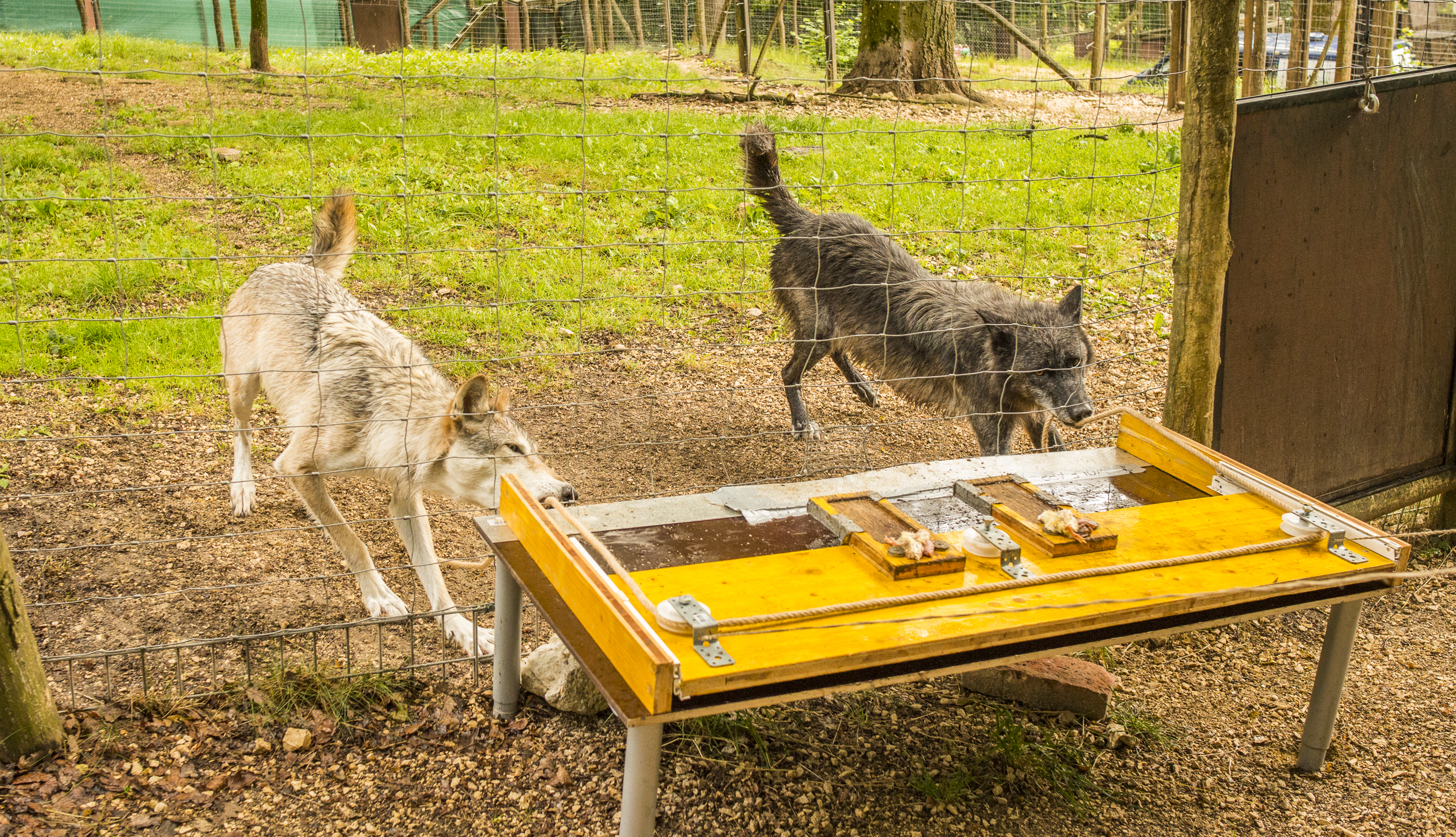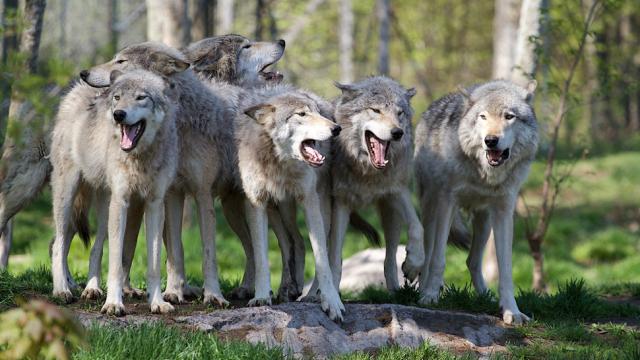Humans and dogs have a long history of working together, leading to the assumption that the collaborative abilities of dogs are the result of domestication. New research suggests this isn’t the case, and that wolves are far better at cooperation than their domesticated cousins, at least when they’re cooperating with one another.
Wolves are better at intra-species cooperation than dogs, suggests new research (Image: Greg Toope/Shutterstock)
New research published in Proceedings of the National Academy of Sciences shows that wolves are much better at cooperating amongst themselves than dogs. In an experiment led by Sarah Marshall-Pescini from the University of Veterinary Medicine in Vienna, Austria, it was shown that dogs are far worse at intra-species cooperation than wolves, and that if anything, domestication is weakening cooperative abilities amongst dogs.
When you think about, this observation makes a lot of sense. Living out in the wild, wolves need each other to survive. These highly social animals hunt together in packs, raise pups, and band together for territorial defence. Among dogs, this evolutionary pressure for intra-species cooperation has ground to a halt, and it’s starting to show. Sure, dogs are good at cooperating with humans, but at a dog-on-dog level, they’re not so good.
For the study, Marshall-Pescini sought to compare the cooperative abilities of wolves and dogs who were raised similarly at the Wolf Science Center in Vienna. At this facility, wolves and dogs live in packs, where wolves hang out with other wolves and dogs with dogs. So these dogs aren’t your run-of-the-mill house pets — they have been socialised in a way that very closely approximates their ancient lifestyle (modern wolves and dogs diverged from a common ancestor about 15,000 years ago).

Two wolves cooperating on a rope-pulling test. (Image: Rooobert Bayer/Wolf Science Center, Ernstbrunn, Austria)
For the experiment, the animals were challenged with a rope-pulling test, in which two animals of the same species (a conspecific dyad) could only access food if both of them pulled on separate rope ends at the same time. This task has been used with a wide range of species, including elephants, ravens, and chimps, with many succeeding in solving the task after a bit of individual training. Marshall-Pescini’s team tested 12 wolves (8 male, 4 female), and 14 dogs (7 male, 7 female). A total of 16 wolf dyads and 10 dog dyads were subjected to the challenge, and under various test conditions; specifically: wolves and dogs with no prior training on the rope-pulling task, individual pre-training on the task, a two-tray scenario (just to complicate things), and delayed entry (where a second animal was introduced into the enclosure after a 10 second delay to test cooperative inclinations).
“[Our] results show that wolves consistently outperformed dogs in the cooperative string-pulling task,” noted the researchers in the study. And it didn’t matter if the dogs or wolves had any prior training or not, or in any of the other test conditions for that matter. Pitifully, dog dyads succeeded at two of 472 attempts or 0.42 per cent, whereas wolf dyads succeeded in 100 of 416 attempts or 24 per cent. That’s a huge difference.
“We were surprised at how little the dogs did cooperate,” Marshall-Pescini told Gizmodo. “We expected a difference but perhaps we were not quite prepared at how big of a difference we saw. Dogs were interested in the task, but they really just took turns interacting, very respectfully waiting for one to finish before the other started…this really limited their ability to discover that they had to act together. It was quite striking.”
At the same time, the wolves were more likely to manipulate the apparatus at the same time than the dogs, which allowed them to figure out how the contraption works. The wolves also cooperated best when they were working with a partner of a similar rank and with close social bonds. This study suggests that dogs didn’t acquire enhanced cooperative abilities as a result of domestication, and in fact, they may have lost a bit of it. At least as far as intra-species cooperation goes.
“These results [also] challenge the ‘big bad wolf’ vs ‘friendly, cute pooch’ idea that we have,” said Marshall-Pescini. “Also considering the ongoing conflicts humans have with wolves, it is perhaps important to draw people’s attention to aspects of their behaviour such as how well they cooperate with each, and how the closeness of the bond between them helps them cooperate better.”
Kathryn Lord, a wolf expert from the University of Massachusetts Medical School in Worcester and the Broad Institute in Cambridge, who wasn’t involved in the study, says the new paper is significant because it tests and debunks the assumption that, due to domestication, dogs are more cooperative than wolves. “There are a lot of myths out there about dog and wolf behaviour, a better understanding of their similarities and differences can improve our interactions with and management of these subspecies,” she told Gizmodo.
Lord said the new study was “lovely” and that the researchers had the advantage of working with dogs and wolves that were raised and kept in similar environments.
“This study’s findings that wolves are better at this cooperative task than dogs is very interesting, but their data does not explain why wolves are better than dogs,” Lord cautioned. “The authors come up with some interesting hypotheses, that are worth testing in the future. Future studies will also help increase the number of animals tested, which is always a challenge when working with wolves and dogs.”
One of the theories was the dogs were deliberately trying to avoid resource conflict amongst themselves, which is why they failed so consistently at the task. But as Lord points out, that theory will need to be borne out in future work.
“This study highlights that the changes that occur due to domestication are not as simple as often assumed, dogs are better at forming social bonds with humans, but as this study highlights that is not the same thing as being better at cooperating,” said Lord. “As the authors mention, wolves’ natural ecological niche involves a lot more complex cooperative behaviour than dogs.’”
[PNAS]
